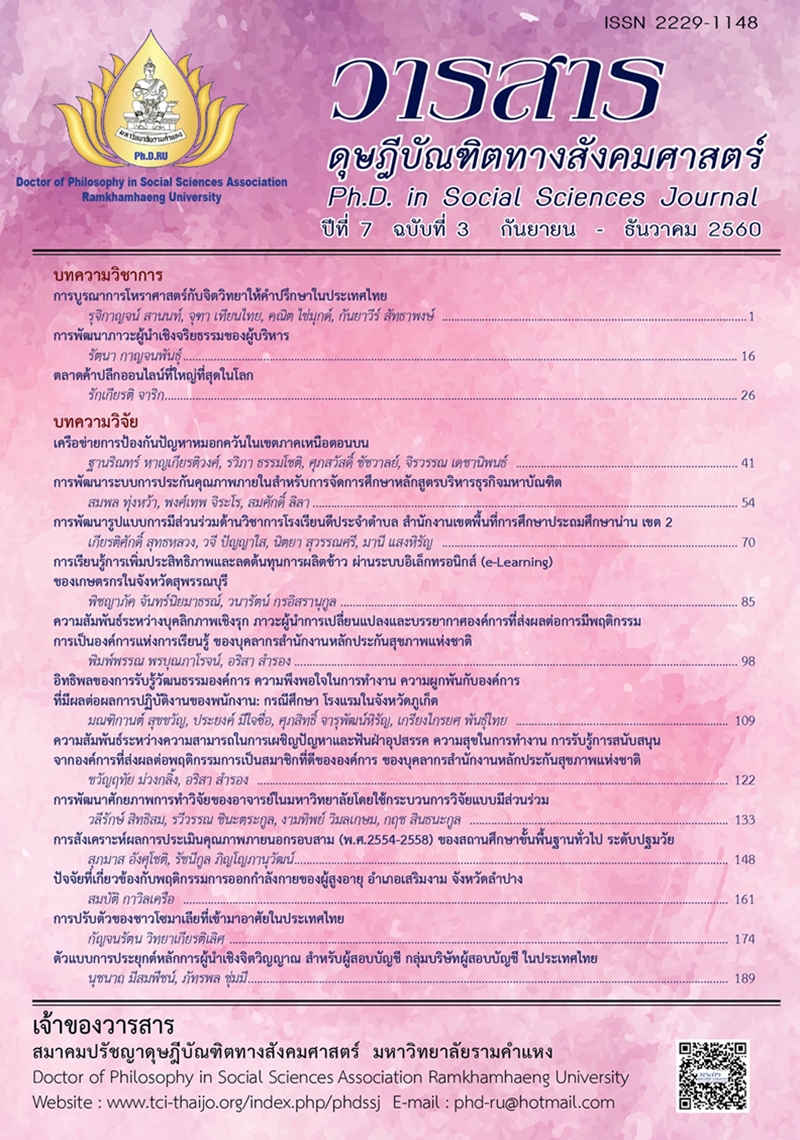ความสัมพันธ์ระหว่างบุคลิกภาพเชิงรุก ภาวะผู้นำการเปลี่ยนแปลงและบรรยากาศองค์การที่ส่งผลต่อการมีพฤติกรรมการเป็นองค์การแห่งการเรียนรู้ของบุคลากรสำนักงานหลักประกันสุขภาพแห่งชาติ
Main Article Content
Abstract
การวิจัย มีวัตถุประสงค์เพื่อ (1) ศึกษาพฤติกรรมการเป็นองค์การแห่งการเรียนรู้ บุคลิกภาพเชิงรุก ภาวะผู้นำการเปลี่ยนแปลง และบรรยากาศองค์การของบุคลากรสำนักงานหลักประกันสุขภาพแห่งชาติ (2) ศึกษาความสัมพันธ์ระหว่างบุคลิกภาพเชิงรุก ภาวะผู้นำการเปลี่ยนแปลง และบรรยากาศองค์การกับพฤติกรรมการเป็นองค์การแห่งการเรียนรู้ของบุคลากรสำนักงานหลักประกันสุขภาพแห่งชาติ และ (3) ศึกษาการพยากรณ์พฤติกรรมการเป็นองค์การแห่งการเรียนรู้ของบุคลากรสำนักงานหลักประกันสุขภาพแห่งชาติ โดยมีบุคลิกภาพเชิงรุก ภาวะผู้นำการเปลี่ยนแปลง และบรรยากาศองค์การ เป็นตัวพยากรณ์ กลุ่มตัวอย่างที่ใช้ในการวิจัยครั้งนี้ คือ บุคลากรระดับปฏิบัติการของสำนักงานหลัก ประกันสุขภาพแห่งชาติ จำนวน 210 คน สถิติที่ใช้ในการวิเคราะห์ข้อมูล ได้แก่ ค่าร้อยละ ค่าการแจกแจงความถี่ ค่าเฉลี่ย และส่วนเบี่ยงเบนมาตรฐาน
ผลการวิจัยพบว่า (1) บุคลากรของสำนักงานหลักประกันสุขภาพแห่งชาติ ส่วนใหญ่เป็นเพศหญิง มีอายุ 26-35 ปี อายุงาน 6-10 ปี มีสถานภาพโสด มีวุฒิการศึกษาอยู่ที่ระดับปริญญาตรี บุคลากรมีพฤติกรรมการเป็นองค์การแห่งการเรียนรู้อยู่ในระดับสูง มีบุคลิกภาพเชิงรุกอยู่ในระดับสูง ผู้นำในองค์การมีภาวะผู้นำการเปลี่ยนแปลงอยู่ในระดับสูง และองค์การมีบรรยากาศองค์การโดยรวมอยู่ในระดับดีปานกลาง (2) บุคลิกภาพเชิงรุก ภาวะผู้นำการเปลี่ยนแปลง และบรรยากาศองค์การมีความสัมพันธ์เชิงบวกกับพฤติกรรมการเป็นองค์การแห่งการเรียนรู้ของบุคลากรสำนักงานหลักประกันสุขภาพแห่งชาติ อย่างมีนัยสำคัญทางสถิติที่ระดับ .05 และ (3) บุคลิกภาพเชิงรุก และบรรยากาศองค์การสามารถร่วมกันพยากรณ์พฤติกรรมการเป็นองค์การแห่งการเรียนรู้ของบุคลากรสำนักงานหลักประกันสุขภาพแห่งชาติ อย่างมีนัยสำคัญทางสถิติที่ระดับ .05
THE RELATIONSHIPS BETWEEN PROACTIVE PERSONALITY, TRANSFORMATIONAL LEADERSHIP AND ORGANIZATIONAL CLIMATE AFFECTING LEARNING ORGANIZATION BEHAVIORS OF OFFICERS IN THE NATIONAL HEALTH SECURITY OFFICE
In this thesis, the researcher studies (1) learning organization behaviors, proactive personality, transformational leadership, and the organizational climate vis-à-vis selected personnel at the National Health Security Office (NHSO). (2) the relationships between proactive personality, transformational leadership, and organizational climate and the learning organization behaviors of these personnel. Finally, furthermore, the researcher frames (3) a predictive equation for learning organization behaviors of the personnel with proactive personality, transformational leadership, and organizational climate as predictor variables. The sample population consisted of 210 operational personnel employed at NHSO. Using techniques of descriptive statistics, the researcher analyzed the data collected in terms of frequency percentage, mean, and standard deviation.
Findings are as follows: (1) The highest proportion of the personnel under study were single female holders of a bachelor’s degree, who were between the ages of twenty-six and thirty-five and who had been employed for a period between six and ten years. These personnel exhibited learning organization behaviors at a high level. They projected a proactive personality at a high level. Organization leaders showed transformational leadership at a high level. The organizational climate was overall evinced at a moderate level. (2). Proactive personality, transformational leadership, and organizational climate were found to be positively correlated with the learning organizational behaviors of the personnel at the statistically significant level of .05. and (3). The proactive personality and organizational climate variables were predictive of learning organization behaviors at the statistically significant level of .05.
Article Details
Academic articles, research articles, and book reviews in the Ph.D. in Social Sciences Journal are author’s opinions, and not the publisher’s, and is not the responsibility of the Ph.D. in Social Sciences Journal Philosophy Association, Ramkhamhaeng University. (In the case that research is done on human, the researcher has to be trained in Ethics for Doing Research on Human Training and has to produce the evidence of the training).


